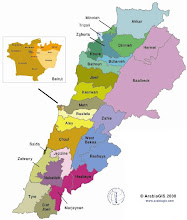 In 1953, Emily Ibrahim was the first Lebanese woman to present her candidacy for the parliamentary elections in Zahle. Ibrahim however was to withdraw her candidacy from the race of 1953 in what is a fitting illustration for women in Lebanese politics.
In 1953, Emily Ibrahim was the first Lebanese woman to present her candidacy for the parliamentary elections in Zahle. Ibrahim however was to withdraw her candidacy from the race of 1953 in what is a fitting illustration for women in Lebanese politics. Chantal Sarkis, The International Foundation of Electoral Systems (IFES) Program Manager, articulated the dire situation of women in
The first women minister was not until 2004. “When the government of Prime Minister Omar Karami was formed in November 2004, Lebanon Leila Solh, daughter of former Prime Minister Riad Solh and Wafaa Hamza, close to Speaker of Parliament Nabih Berri were appointed ministers,” said Sarkis.
| Chart of Female Candidates to the Parliament from 1953 to 2005 | Nb. Of Female Candidates | Nb. Of Female Winners |
| 1953 | 1 | 0 |
| 1957 | 1 | 0 |
| 1960 | 2 | 0 |
| 1963 (by election) | 1 | 1 |
| 1964 | 2 | 0 |
| 1965 (by election) | 1 | 0 |
| 1968 | 2 | 0 |
| 1972 | 4 | |
| 1991 | 0 | 1 (appointment) |
| 1992 | 6 | 3 |
| 1996 | 11 | 3 |
| 2000 | 18 | 3 |
| 2005 | 14 | 6 |
Source Lebanese Parliament
There has been a debate about introducing a quota system and most formally a quota was included in the Boutros Commission proposal for a new electoral law, this proposal was rejected. However, Sarkis explained that, “during the parliamentary sessions of September 2008 to vote on a new electoral law no concrete system was proposed and the reserved seat system was intentionally neglected due to the fear of adding another quota to the existing confessional and geographical quota.”
Sarkis argues that although the quota system was rejected the push for higher representation of women in parliament should not stop. “There are three different ways in which this battle can be fought: Reserved seats, Statutory gender quotas or Voluntary gender quotas.” The advantage of the voluntary gender quota does not require a law or regulation and relies on the will of the political parties. The best system Sarkis argues for
While the chance to implement such a strategy for the upcoming election has long since gone Sarkis is focusing on the 2010 municipality elections. “This should be the right time and place to implement a number of reformist steps starting with the women quota and ending with a radical change of the electoral system.”




No comments:
Post a Comment